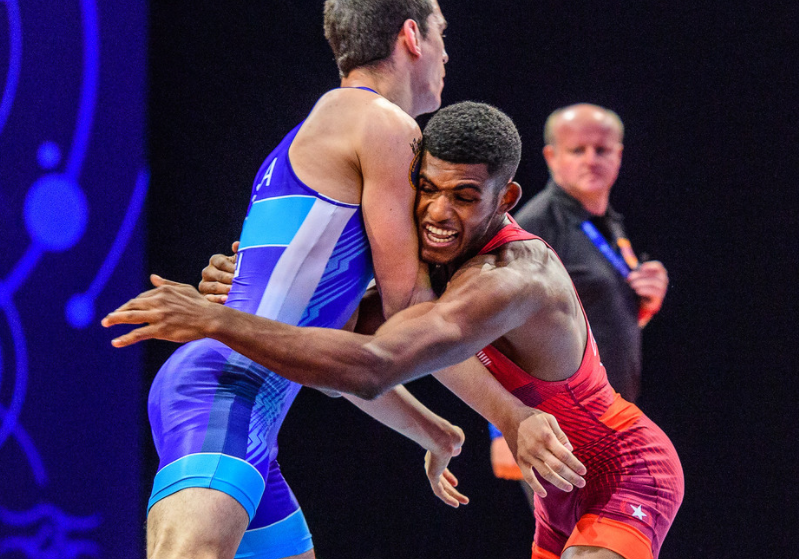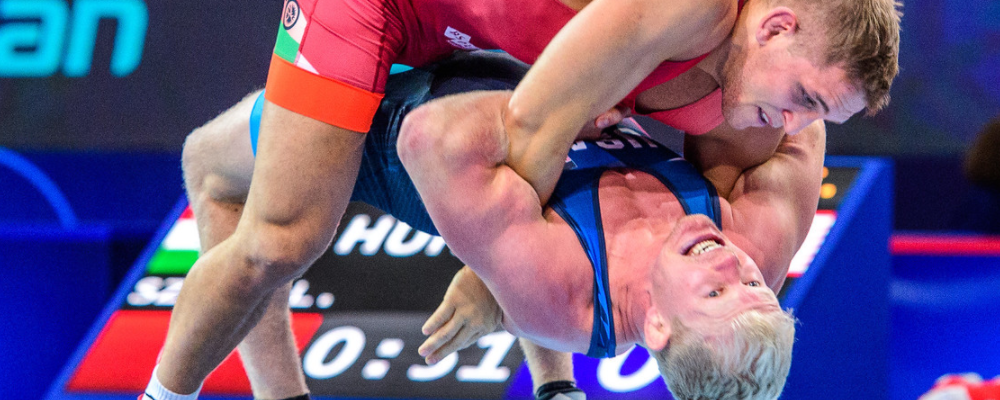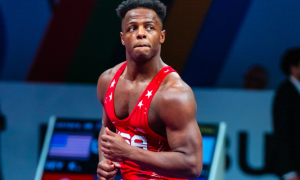The United States Greco-Roman Seniors will be returning home from a World-level event without a medal for the second straight year.
Following a frustrating first day of action which saw all four US wrestlers eventually miss out on the medal rounds, Day 2 offered new promise despite the slate of competition awaiting each wrestler.
On this, the second day of the 2017 Greco World Championships, held at the AccorHotels in Paris, France, the US brought four athletes to the arena deemed capable of putting together strong performances only to see each one go down in disappointing fashion. Ildar Hafizov (59 kg, Army/WCAP) had been a top-flight competitor and an Olympian while wrestling for his native Uzbekistan, and appeared to be a prime candidate to advance given his years of experience overseas. Two-time Junior World bronze medalist Ellis Coleman (66 kg, Army/WCAP), one of the nation’s most talented and battle-tested wrestlers, hit a resurgence in 2017 that suggested he, too, could be on the cusp of something big in Paris. Alas, that didn’t happen (and it wasn’t necessarily his fault).
Then there were the two elder statesmen observed as the anchors of the squad. Cheney Haight (80 kg, NYAC), the quiet warrior known as perhaps the hardest-pushing US Greco-Roman representative during his decade-plus career, and Robby Smith (130 kg, NYAC), the high-scoring heavyweight who has also become one of the most popular wrestlers in the country.
Coleman and Smith scored first-round victories while Hafizov and Haight were both turned back in their opening bouts. Needless to say, this wasn’t the performance Team USA was expecting, though there were bright spots and we’ll get to those later. For now, it’s all about the athletes and a day in Paris that hopefully, will wind up serving as a motivating force for the program in the still-early phase of the current quad.
HAFIZOV
Hafizov was probably going to have his hands full with Vazgen Khachatryan (ARM) and that was indeed the case. Thing is, Hafizov actually wrestled quite well and would have been in this one if not for an early miscue that led to his undoing.
There wasn’t a lot of pretense to start this one. The two wrestlers immediately clashed inside with both finding room to work. You could tell some scoring was on its way. Sure enough, Hafizov and Khachatryan engaged each other in a clinch, each with a 50/50 lock and their hips out. It’s a position that is as synonymous with Greco as a gutwrench or arm throw, and often leads to highlight-reel techniques. Hafizov made the mistake of pressing in a little too much, giving Khachatryan the resistance he needed to take a risk and arch back. The attempt was successful. Khachatryan jumped ahead with a 4-0 lead and the action was still under a minute in.
After the reset, Hafizov took the initiative with over-under’s and drove forward. Once again, Khachatryan went to arch back but this time, the WCAP wrestler was ready and landed on top for two points. 4-2, Khachatryan. Hafizov was moving well now. He was becoming more assertive and started to try to dictate the positions. Hafizov latched a front headlock from standing but came across the throat, resulting in a warning. Immediately following the warning, he repeated the infraction and despite holding a hand free to show there was no malicious intent, the referee penalized him for a caution-and-two. 6-2, Khachatryan.
Hafizov came out with more vigor in the second and was able to find success jamming inside with underhooks. He was also operating at a quicker tempo. He’d receive a passivity point to cut the deficit to 6-3. Three points is a lot to make up in any bout at this level, nevermind a World Championships match, but it seemed like Hafizov had the momentum on his side. He was pressuring Khachatryan towards the latter stages of the second period and a multi-point sequence did not appear to be out of the question. It wasn’t — but Khachatryan is the one who scored. As Hafizov careened in off of an exchange in the center, he became extended, giving Khachatryan a clear lane to wrap a bodylock that he took over at the edge for a correct throw. Hafizov fought as hard as he could for the remaining :30, pummeling in with near desperation. There were no holes to exploit as Khachatryan advanced via an 8-3 score.
Khachatryan lost to Kenichiro Fumita (JPN, world no. 3) in his next match to eliminate Hafizov from medal contention.
COLEMAN
Coleman’s half of the bracket, stacked with stars, meant that he was going to be provided with fierce opposition should he move on. That made it a good idea to get off to a fast start in his first-round match against Diego Ribeiro Romanelli (BRA). A deep underhook from Coleman caused Ribeiro Romanelli to bail out, eliciting a reset. The tone was now in place. Coleman went over the top of the Brazilian next and collapsed him down for two. They returned to the feet with both jockeying in the ties, Coleman speedily darting in underhooks while commanding the center. Shortly after, the American worked Ribeiro Romanelli out for a point. 3-0, USA. He was in complete control in every facet. The physicality was there, the quickness, the confidence — this is what Coleman can bring. Another step-out with just over a minute left in the period made the score 4-0, but the end wasn’t too far away now.
Coleman, his leverage an obvious factor throughout, used a high overhook to walk Ribeiro Romanelli to the edge and down for two more points. This was the pattern — Coleman getting inside, dominating the tie-ups, and moving his opponent across the mat. Another step-out arrived with :30 remaining and one more for good measure closed this one out shortly before the break. Coleman earned himself a dominant technical fall win on the strength of a whopping five step-out points.
It seemed like Coleman would match up well with Mate Nemes (SRB), and not because recent domestic rival Alex Sancho (NYAC-OTS) scored a win over the Serbian back in March. Nemes offers playback in spurts and can be caught flat-footed against faster, more active wrestlers. That’s Coleman. But unfortunately, the method of governance in which Greco is beholden stopped this from becoming the dogfight it should have been.
Right away, Coleman was victimized. A caution-and-two was given to Nemes for pushing on the face. Coleman had made a high dive attempt and in the ensuing exchange, extended his arms towards Nemes’s head to create distance. A warning would have been suitable but instead, Coleman was knocked for two points and the match had barely begun. You really hate to acknowledge the turning point of a bout as being the result of an early caution, especially since there was more than enough time for the extremely-talented Coleman to tack on some points. However, in an event where the stakes are enormous, a call like that has a habit of playing a much larger role than it deserves.
So Coleman fought. He wanted to disrupt Nemes with choppy tie-ups and doses of brutal-yet-purposeful pummeling, a difficult proposition considering the Serb held the lead and would only have to present enough activity so as to avoid being dinged for passivity.
Coleman’s best chance at a potential score came on a brisk high dive attempt early in the second period, though soon after, Nemes was given a passivity point to increase his lead to 3-0. Again, curious. It took until the last minute of the match for Nemes to finally be knocked himself, and that came following a barrage of attempts by Coleman, who was by now feverishly clashing in and lowering his level to do anything he could to get to the body. The effort was in vain. Nemes advanced over Coleman 3-1 in one of the more bitter defeats of an American during the course of the last two days.
Nemes was trounced by Artem Surkov (RUS, world no. 1) in the quarterfinals to end Coleman’s day at the tournament.

Coleman (red) swoops in on a high dive attempt at the 2017 Greco World Championships. (Photo: Tony Rotundo)
HAIGHT
In what could be Cheney Haight’s swan song, the Utah native demonstrated the toughness, will, and ability that has made him such a pleasure to watch all of these years. His opponent, Laszlo Szabo (HUN, world no. 15), has been a fixture on the international scene for nearly a decade himself, putting together a more-than-solid career with a bronze at December’s non-Olympic World Championships serving as the highlight. Szabo certainly entered this bout as the favorite, but it wasn’t he who seized control of the proceedings to begin.
Haight is and has been perhaps the hardest pummeler in the US throughout his time on the Senior level, and that’s what you saw here. He is a consummate pro in the sense that he very rarely overextends or betrays glaring vulnerabilities that leave him open. At the same time, Haight makes it his business to try and outwork every opponent in the tie-ups to where they become grinded down.
It certainly looked that this was going to be his key to victory over Szabo and he held a two-point lead at the break. This was the version of Haight that could do something here. He was a monster inside, shuffling between tie-ups while doggedly pressuring forward. However, meaningful attempts were hard to come by and against someone like Szabo, that can prove costly. It did here, as the Hungarian was gifted a passivity point early in the second. Szabo next got in a bodylock for a takedown before following up with a gutwrench to race out in front 5-2. Haight was still doing what he could to deliver pressure, but the tide had turned solely in Szabo’s favor. He was able to get behind the American towards the edge for another takedown/gutwrench sequence to pull even further ahead with a minute left.
Only :30 remained when the curtain dropped. Haight, needing to score — a lot — and quickly — clamped on double overhooks. He didn’t have it tight enough. As he went to arch back, Szabo collapsed on top to hold Haight down for the fall.
Szabo was defeated in the next round by Askhat Dilmukhamedov (KAZ), ending Haight’s bid for a medal.
ROBBY
Smith was walking into the 2017 Greco-Roman World Championships maybe not as a favorite to win it all, but he was certainly perceived to be one of the United States’ best chances at a medal. That’s what happens when you’ve taken fifth twice and have scored numerous signature wins in your career. In addition, Smith came back from his post-Rio hiatus extremely strong, winning the Thor Masters Invitational before sewing up his fourth Senior World Team spot. He had been wrestling well in 2017 and this World tournament appeared to offer a great opportunity for him to take his first steps onto the podium.
Tamas Soos (SLO) quickly found out just how dangerous Smith can be in their round of 32 match-up. The popular Californian earned the first passivity point a minute in and tallied another when he forced Soos out of bounds. Shortly after, Smith bulldozed into an over-under and beautifully launched Soos to his back, the signal for the pin arriving just a few seconds later. Smith with quite the startling display in his opening bout.
Chilean heavyweight Yasmani Acosta Fernandez proved to be a much more difficult task in the round of 16. As is custom, Smith was forced to try and pummel inside against a larger opponent who could take advantage of the size difference by slowing down the pace. Acosta Fernandez accomplished this by holding Smith’s right wrist whilst hanging onto a high right underhook. This is active blocking, yet it was Smith who would be penalized for passivity, giving Acosta Fernandez a 1-0 lead.
The one facet of the first period Acosta Fernandez did legitimately have the edge over Smith had to do with keeping the center. Smith spent a little more time with his back to the edge during the grinding pummel, which is always going to get the officials’ attention. Acosta Fernandez earned another passivity point before the break, putting Smith behind 2-0.
The song remained the same in the conclusive frame. Acosta Fernandez plodded forward as Smith steadily tried to weave in underhooks. This wasn’t a one-man show — Smith was working hard for that tiny window or that flailing appendage he could pounce on. But as was the case in the first, Acosta Fernandez was able to put Smith on his heels and this would wind up delivering a step-out point and a 3-0 advantage. The OTC athlete upped his activity level from then on, looking for snaps, hooks, or a tie-up that might offer a flicker of opportunistic scoring. He’d get a passivity point in the final minute, but that would be all. Acosta Fernandez prevailed with 3-1 victory that all but took the wind out of the American presence inside the arena.
Acosta Fernandez advanced to the semifinal where he fell to two-time World Champion and former Olympic silver medalist Heiki Nabi (EST, world no. 13), putting an end to Smith’s chance at a bronze.
REMINDER — Five Point Move will be on the air live at 4pm EST with a special wrap-up show hosted right here. Also, stay with us on Facebook & Twitter on both days of the 2017 Greco World Championships for exclusive coverage and interviews.
2017 GRECO WORLD CHAMPIONSHIPS DAY 2 FINALS PAIRINGS
59 kg: Kenichiro Fumita (JPN) vs. Mirembek Ainagulov (KAZ)
66 kg: Artem Surkov (RUS) vs. Ryu Han-Soo (KOR)
80 kg: Maksim Manukyan (ARM) vs. Radzik Kuliyeu (BLR)
130 kg: Riza Kayaalp (TUR) vs. Heiki Nabi (EST)
TEAM USA DAY 2 RESULTS
59 kg — Ildar Hafizov
LOSS Vazgen Khachatryan (ARM) 8-3
66 kg — Ellis Coleman
WON Diego Ribeiro Romanelli (BRA) 8-0, TF
LOSS Mate Nemes (SRB) 3-1
80 kg — Cheney Haight
LOSS Laszlo Szabo (HUN) via fall
130 kg — Robby Smith
WON Tamas Soos (SLO) via fall
LOSS Yasmani Acosta Fernandez (CHI) 3-1
2017 Greco-Roman World Championships
AccorHotels Arena, Paris, France
Monday, August 21st — 71 kg, 75 kg, 85 kg, 98 kg
Tuesday, August 22nd — 59 kg, 66 kg, 80 kg, 130 kg
Live streaming available in the United States on Trackwrestling.com
SUBSCRIBE TO THE FIVE POINT MOVE PODCAST
iTunes | Stitcher | Spreaker | Google Play Music | RSS

Notice: Trying to get property 'term_id' of non-object in /home/fivepointwp/webapps/fivepointwp/wp-content/themes/flex-mag/functions.php on line 999















